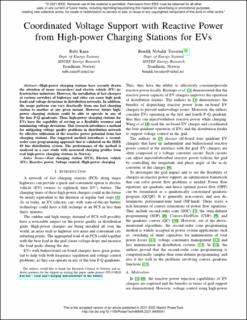| dc.contributor.author | Rana, Rubi | |
| dc.contributor.author | Torsæter, Bendik Nybakk | |
| dc.date.accessioned | 2021-10-08T11:19:00Z | |
| dc.date.available | 2021-10-08T11:19:00Z | |
| dc.date.created | 2021-08-10T13:00:31Z | |
| dc.date.issued | 2021 | |
| dc.identifier.citation | 2021 IEEE Madrid PowerTech | en_US |
| dc.identifier.isbn | 978-1-6654-3597-0 | |
| dc.identifier.uri | https://hdl.handle.net/11250/2788711 | |
| dc.description.abstract | High-power charging stations have recently drawn the attention of many researchers and electric vehicle (EV) infrastructure industries. However, the installation of fast chargers at various corridors of highways and cities can cause high peak loads and voltage deviations in distribution networks. In addition, the usage patterns can vary drastically from one fast charging station to another at any given instant. However, future high-power charging stations could be able to operate in any of the four P-Q quadrants. Thus, high-power charging stations for EVs have the capability of serving as a flexibility resource and minimising voltage deviations. This research introduces a method for mitigating voltage quality problems in distribution network by effective utilisation of the reactive power potential from fast charging stations. The suggested method introduces a second-order cone programming approach that is validated on the IEEE 69 bus distribution system. The performance of the method is analysed in a case study with measured charging profiles from real high-power charging stations in Norway. | en_US |
| dc.language.iso | eng | en_US |
| dc.publisher | IEEE | en_US |
| dc.relation.ispartof | 2021 IEEE Madrid PowerTech | |
| dc.title | Coordinated Voltage Support with Reactive Power from High-power Charging Stations for EVs | en_US |
| dc.type | Chapter | en_US |
| dc.type | Peer reviewed | en_US |
| dc.description.version | acceptedVersion | en_US |
| dc.identifier.cristin | 1925033 | |
| dc.relation.project | Norges forskningsråd: 295133 | en_US |
| cristin.ispublished | true | |
| cristin.fulltext | postprint | |
| cristin.qualitycode | 1 | |
